
Betta fish are beautiful, captivating fish that are pretty easy to care for, given the right conditions.
However, sometimes, even if you feel like you’re doing everything right, your Betta can stop moving.
You might be wondering if they’re sick, upset, or even worse: dead.
Thankfully, it’s not always the latter.
Sometimes your Betta will stop moving due to very fixable problems, and not all hope is lost right away.
It’s easy to pinpoint whether something is truly wrong with your Betta or not.
One of these behaviors is sure to match up with whatever might be going on with your fish.
Enough talk. Let’s get to the bottom of whatever might be wrong with your Betta.
Why Is My Betta Not Moving?
1. They’re Sleeping
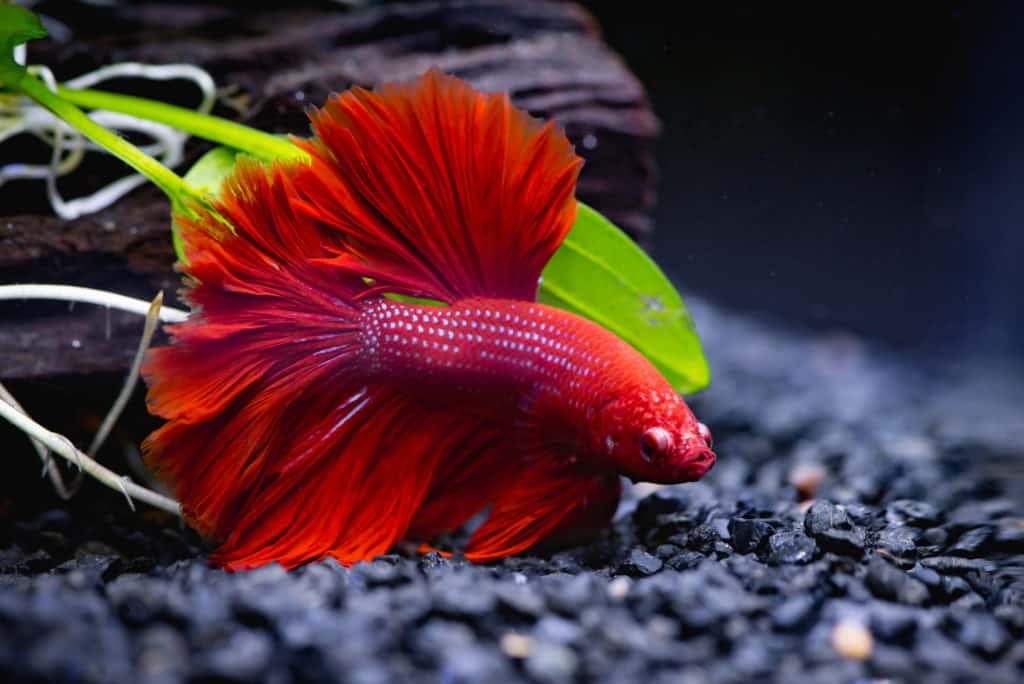
In the best-case scenario, your usually-active Betta is just resting, and there’s nothing to be concerned about.
An immobile, pale Betta is likely just fine.
They lose their color when they sleep and then get it back once they wake up.
Bettas rest when it gets dark, so you might just be catching your Betta napping, in a sense.
Bettas have a sleep pattern just like yours and mine.
They sleep at night and are active during the day.
A good way to tell whether your Betta is sleeping or not is to take a look at its position.
If it’s slightly curled, lying vertically, or lying on its side with its head pointed down, it’s most likely sleeping.
You’ll commonly see this behavior when your Betta is in the dark.
However, if you have a somewhat lazy Betta, they may take naps in odd places during the day.
The best way to tell is to turn the lights on.
If your Betta really is just sleeping, they may startle and begin to swim again.
Being incredibly light sleepers, they will wake up at the slightest noise or movement, and they will definitely wake when the lights are turned back on.
Another way to tell is to watch your Betta closely to make sure they’re breathing.
Watch their mouth and gills for movement.
If that’s the case, your Betta is likely just fine, and it’s best to just let them get their sleep.
2. Their Tank Has the Wrong Conditions
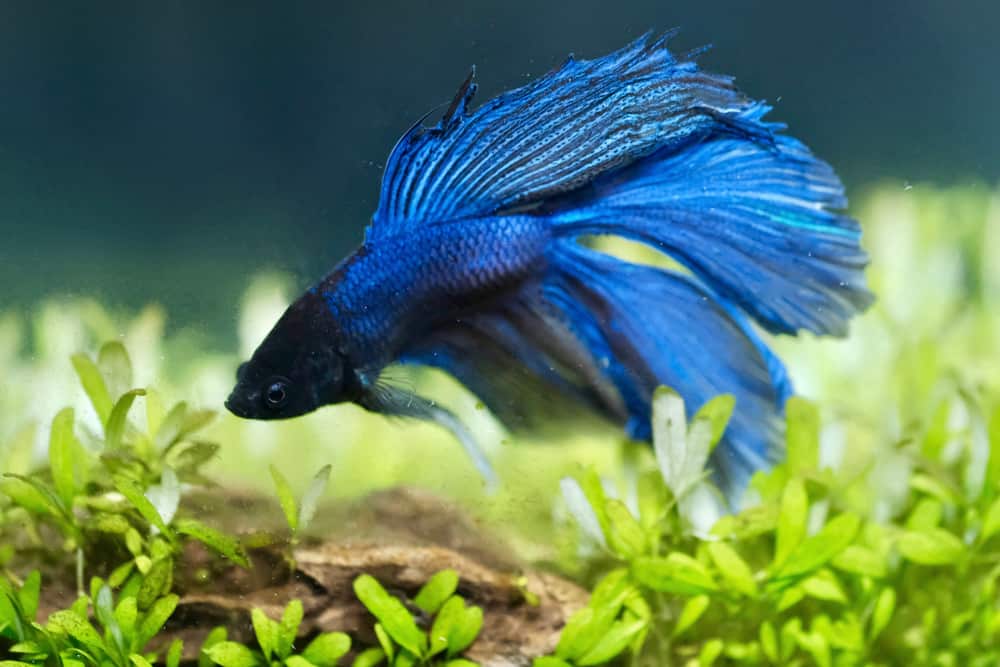
A more serious issue which may cause your Betta to stop moving is bad tank conditions.
Most of the time, when the conditions are off and your Betta isn’t moving, it’s due to temperature.
A Betta’s tank should be between 72 and 82 degrees, and when the water gets to be too cold, it can make them sluggish or make them stop moving altogether.
Bettas are tropical fish, and when they get too cold, it can throw them out of whack.
They can stop moving, and the colder water can compromise your Betta’s entire immune system, making them more prone to illnesses.
Other conditions that should be met for your Betta include the pH, which should be somewhere between 6.8 and 7.5, and their tank should be no smaller than three gallons.
3. They Have Swim Bladder Disease
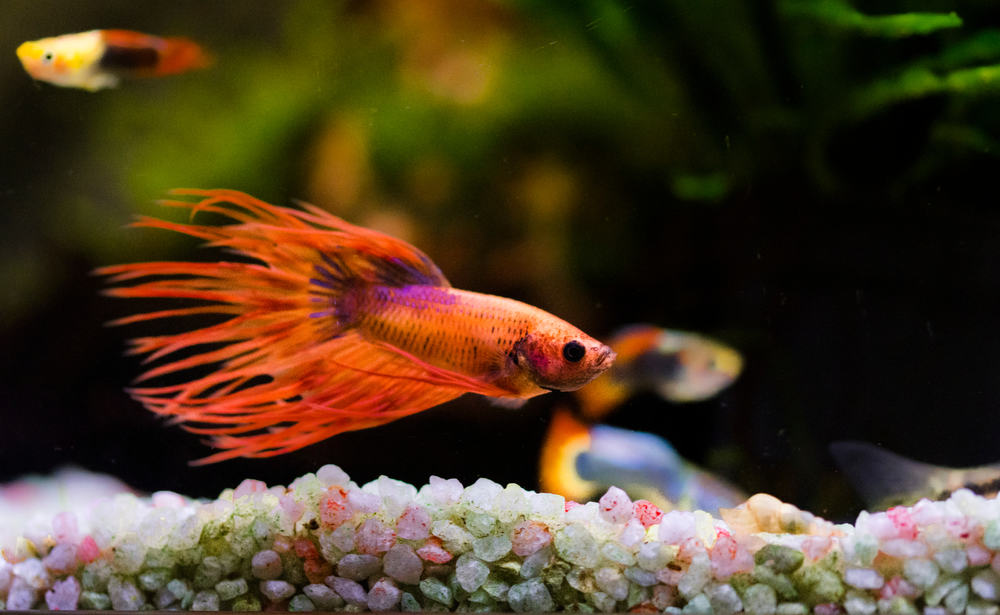
A common condition which may be the cause of your Betta’s immobility is Swim Bladder Disease.
The swim bladder is an organ in your fish that fills with gas to control buoyancy. It’s what makes your fish swim upright at the depth they need.
When your fish develops Swim Bladder Disease, your fish will either swim sideways, upside down, or sink to the bottom of the tank, which renders them immobile.
There are a few different causes for swim bladder issues, one being when the swim bladder is being pressed up against and squished by other organs in your fish.
For example, if your fish is constipated, it can cause problems with their swim bladder.
If you think your Betta is constipated, try either feeding them less or not at all for a couple of days, or feed them a shelled pea for a little extra fiber.
If constipation isn’t the culprit, there may be bacteria in the water affecting your Betta’s swim bladder.
If an infection is suspected, it may be necessary to use a broad-spectrum antibiotic, which you will have to take your fish to the vet to acquire.
A few other good ways to treat swim bladder include warming the tank to somewhere between 78 and 80 degrees or adding a small amount of aquarium salt to the tank.
4. They May Be Dead
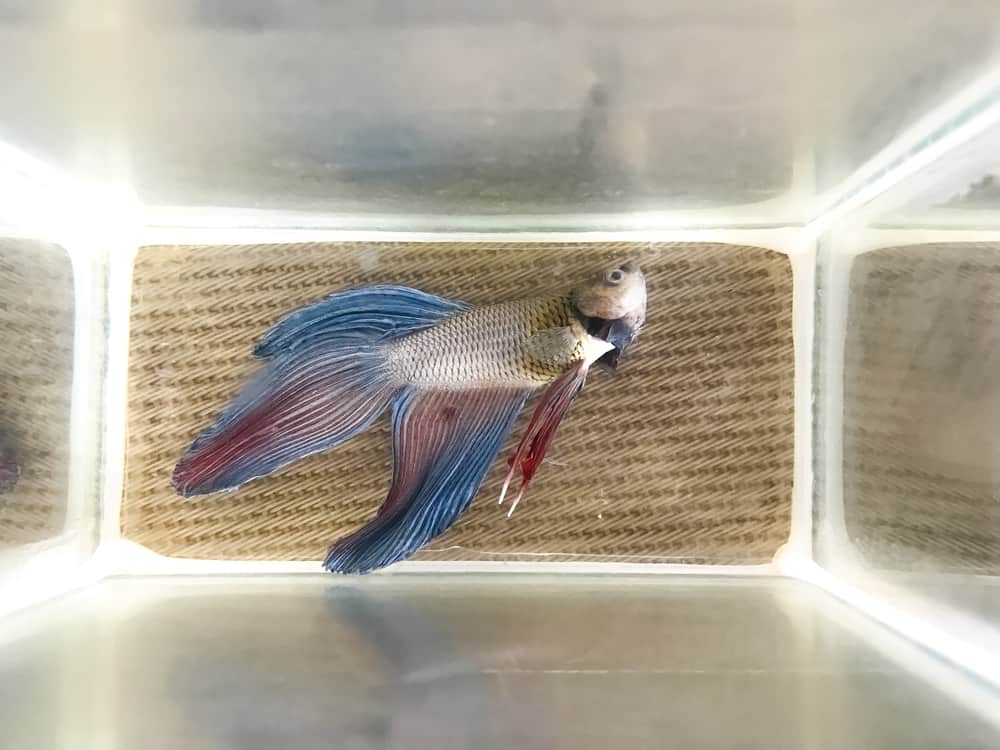
Finally, we come to the worst-case scenario and the grimmest answer.
Your Betta may be dead on the bottom of their tank.
One way to check is to watch their gills closely and look for signs of breathing.
You can also try either tapping lightly on the glass or moving the water a little bit, because that will get you a reaction if they’re still alive, even if they are sick.
Bettas live for anywhere between three and five years, so if your Betta is on the older side, this is a very real possibility.
We truly hope this is not the case, but make sure they really are dead before you flush them.
5. Equipment Failures

There are a few other things aside from what we’ve already listed which may leave your Betta not wanting to move.
Thankfully, there are some simple solutions, and a few fixes shouldn’t take long at all.
Other causes can include the Betta being too cold, the water being of poor quality, and even ammonia poisoning.
Pay close attention to your Betta’s behavior, and carefully examine their environment.
The best thing to do if the problem is small is to nip it in the bud while you can.
1. A Broken Heater or Lack Thereof
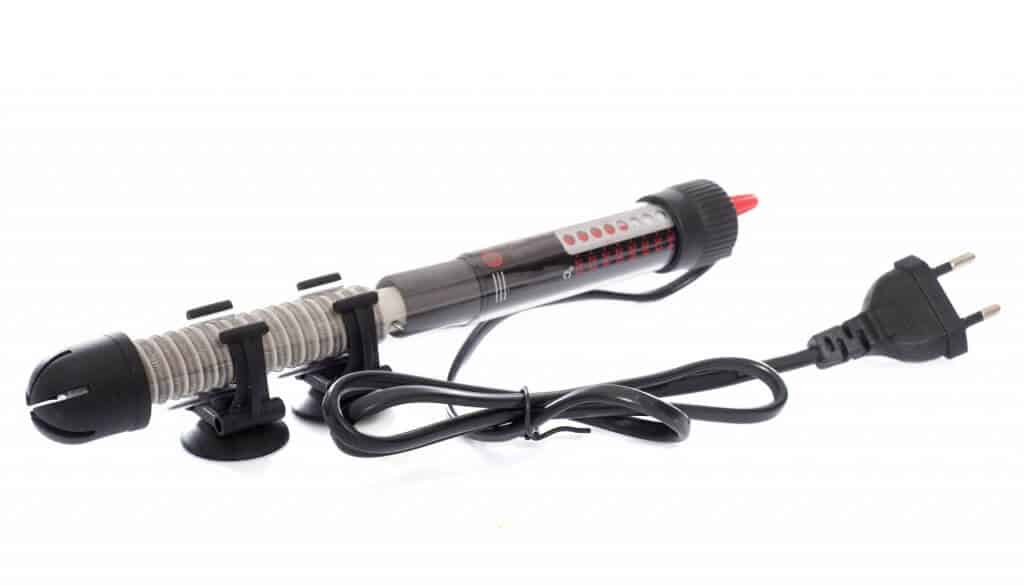
One issue we mentioned earlier was the water being too cold.
Sometimes heaters malfunction or break down and stop heating the water properly.
If you don’t have a heater at all, you should invest in one for sure.
In the meantime, there are other ways you can heat your Betta’s tank without a heater.
A few good methods to temporarily heat up your tank include turning up the heater in your home, keeping the tank away from windows (unless it’s a particularly sunny day), and placing hot water in a bag to let it float in your aquarium.
If the top of your tank is open, you could place a towel over the opening to keep the heat in.
While on the subject of towels, you could also wrap towels around the tank’s base and sides.
Just be aware that the sudden change in light might frighten your Betta a little at first.
You can also place your tank under or near a lamp or even light candles around it.
Do keep in mind, however, that these are only temporary solutions which should only be used until you’re able to install an actual, properly working heater.
2. Temperature Shock

However, if your tank gets too warm or too cold too fast, it can shock your Betta and leave them immobile.
Make sure to warm up your water gradually, as the temperature shock can do more harm than good, no matter your intention.
While using methods mentioned above, be sure to watch your Betta carefully and keep an eye on your method.
Never leave candles burning unattended, and make sure you don’t leave your Betta’s tank on a windowsill overnight.
If you can, try to monitor the water’s temperature with a thermometer to make sure the water is actually heating up, and that it happens at a gradual pace.
If they get too hot too fast, they will be seen breathing rapidly, spending a lot of time at the surface, and swimming erratically.
3. A Broken Filter

Your water may not be filtered properly, and it may be difficult for the Betta to survive due to chemicals that might be in the water.
Depending on the filter you have, it could also be an issue linked to aeration.
Without a filter or something of the like to break the surface tension of the water, it could be that your Betta is suffering from a lack of air.
It’s also a good idea to change your filter regularly to make sure any irregularities in the water are straightened out as soon as possible.
4. Ammonia Poisoning

Another, very real issue that might be at fault is ammonia poisoning.
You’ll know when your Betta is suffering from ammonia poisoning when you see them lying at the bottom of their tank, breathing heavily.
There are a couple of things which can cause ammonia poisoning, including a broken or improper filter, and various plants that may be in the tank.
One plant that will cause ammonia poisoning in your tank is bamboo.
The leaves begin to die as soon as the plant is submerged, and it will create fatal amounts of ammonia.
Meanwhile, if your filter is broken, it’s failing to clean the water properly, and leaving your Betta exposed to harmful chemicals like that will lead to their death.
It’s important to quickly pinpoint what the source of ammonia is in your tank.
Ammonia poisoning can be fatal if not properly dealt with quickly.
5. They May Be Egg-Bound
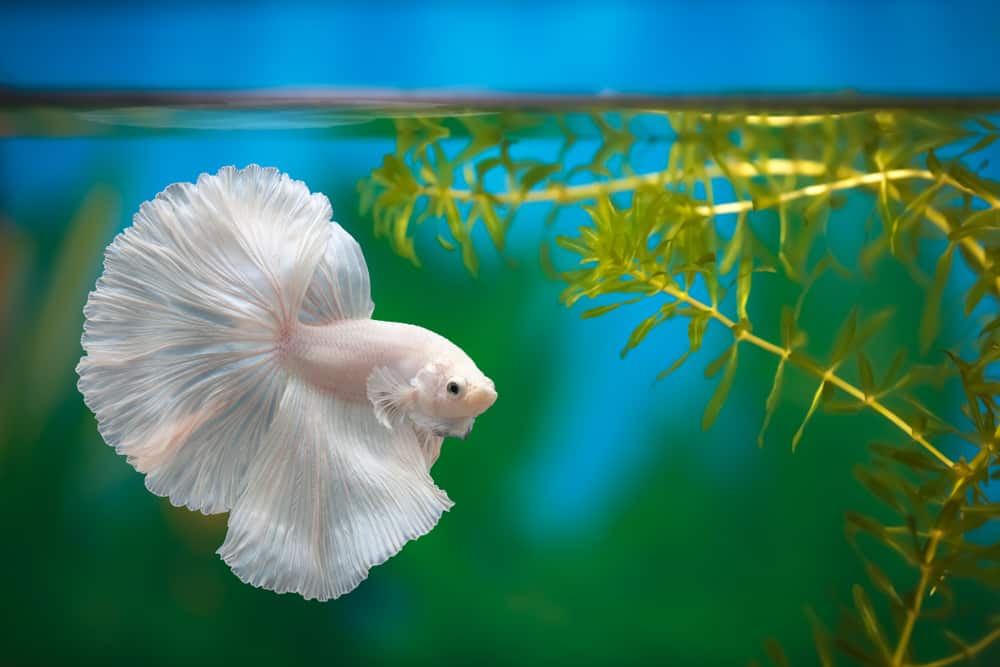
Another common reason your Betta may be lying at the bottom of their tank is that she may be egg-bound.
If you’ve been trying to breed Bettas, an immobile female may be a sign that you’re on the right track.
During the fertilization process, female Bettas go into a state of mock-shock.
During the mating process, the male will squeeze the female, holding her still while she lays eggs that will fall to the bottom of their tank.
Then the female will float around and look dead for a few minutes before waking and trying to help the male move the eggs from the bottom of the tank to a bubble nest.
If you are trying to breed Bettas, it’s important to take the female out of the tank after she wakes up and looks lively again, as the male Betta will probably try to kill her.
Things Will Be Betta Soon
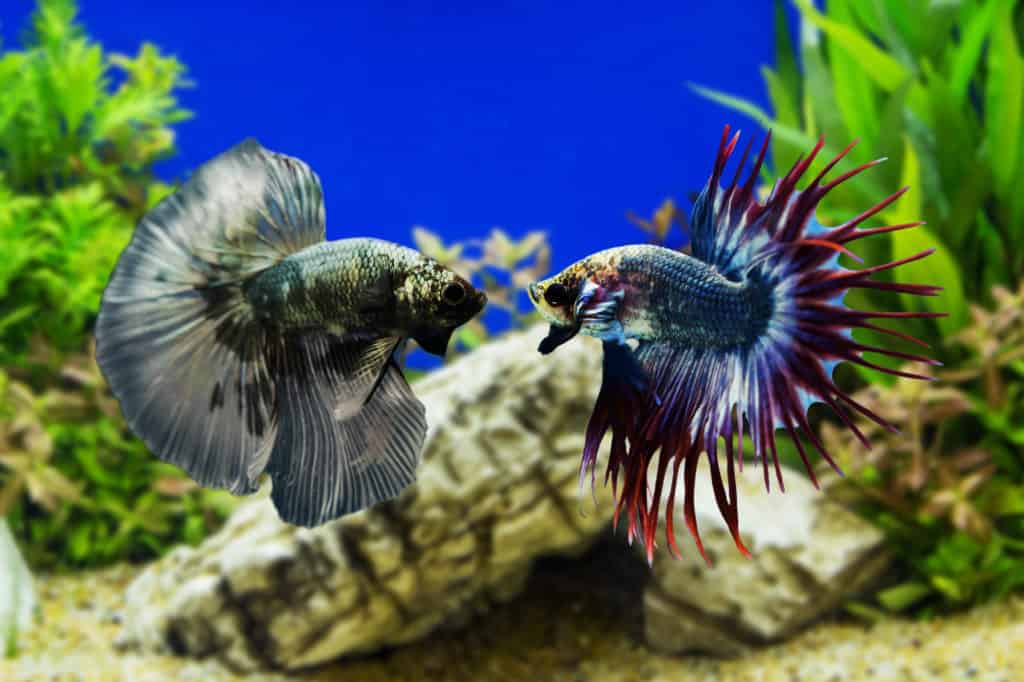
With all possibilities out of the way, one of them has to be the culprit.
There are quite a few things that can throw your Betta for a loop and leave them motionless at the bottom of their tank.
Now it’s just a matter of figuring out what might be wrong and making it right again.
Hopefully, there’s a simple solution!
Whatever the issue may be, we hope it clears up soon and your Betta is back to their usual self.
Best of luck to you!
Do you have any advice for helping out an immobile Betta?
What was the issue for your fish?
Leave us a comment down below.
We are always looking forward to hearing what you have to say!
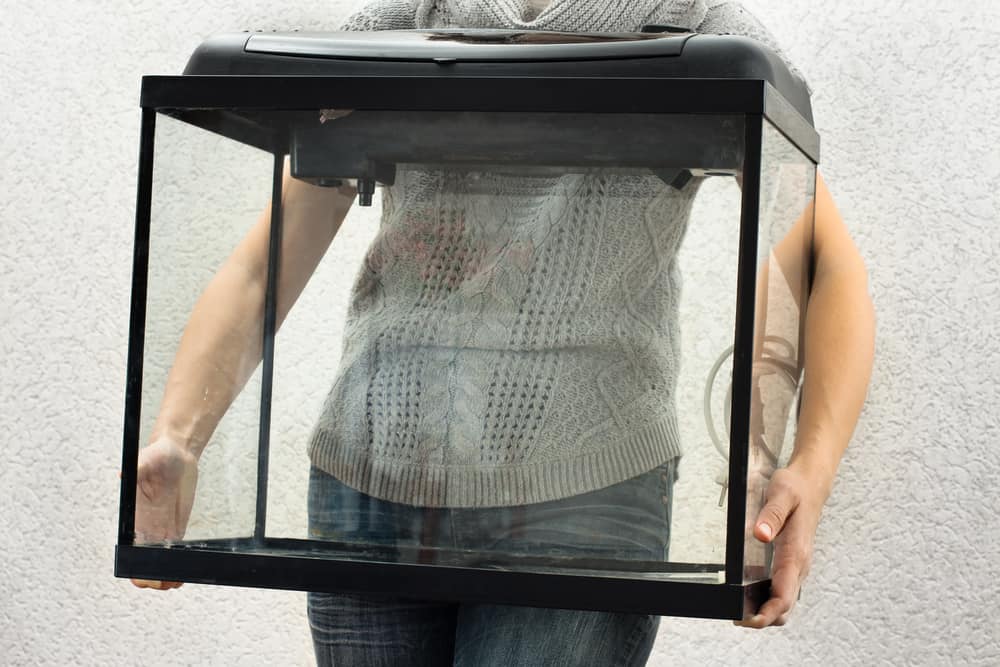
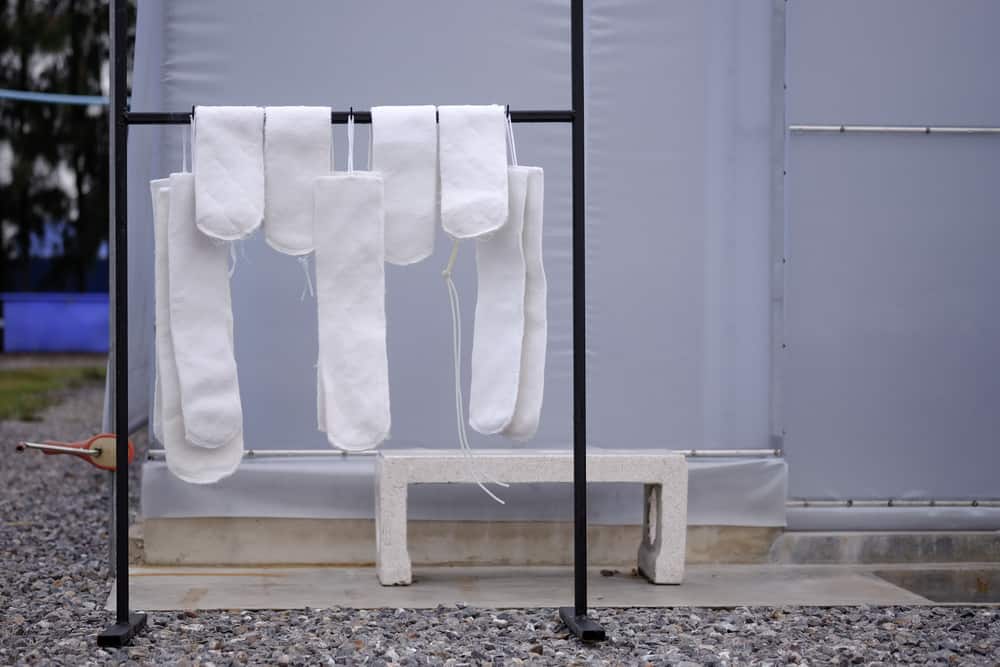

Leave a Reply
You must be logged in to post a comment.